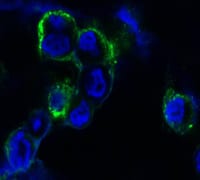
| WB | 咨询技术 | Human,Mouse,Rat |
| IF | 咨询技术 | Human,Mouse,Rat |
| IHC | 咨询技术 | Human,Mouse,Rat |
| ICC | 1/200 - 1/1000 | Human,Mouse,Rat |
| FCM | 咨询技术 | Human,Mouse,Rat |
| Elisa | 1/10000 | Human,Mouse,Rat |
| Aliases | HTK; MYK1; TYRO11 |
| Entrez GeneID | 2050 |
| clone | 5B5 |
| WB Predicted band size | 108kDa |
| Host/Isotype | Mouse IgG1 |
| Antibody Type | Primary antibody |
| Storage | Store at 4°C short term. Aliquot and store at -20°C long term. Avoid freeze/thaw cycles. |
| Species Reactivity | Human |
| Immunogen | Purified recombinant extracellular fragment of human EPHB4 fused with hIgGFc tag expressed in HEK293 cell line. |
| Formulation | Purified antibody in PBS with 0.05% sodium azide. |
+ +
以下是关于EPHB4抗体的3篇参考文献及其摘要概括:
---
1. **文献名称**:*Therapeutic targeting of EPHB4 with antibody-drug conjugates in preclinical models of cancer*
**作者**:Xi H, et al.
**摘要**:该研究探讨了EPHB4抗体偶联药物(ADC)在多种癌症模型中的抗肿瘤效果,发现其通过靶向EPHB4高表达的肿瘤细胞,显著抑制肿瘤生长并减少转移,提示其作为新型癌症疗法的潜力。
---
2. **文献名称**:*EPHB4 inhibition suppresses tumor angiogenesis via blocking endothelial cell survival*
**作者**:Martiny-Baron G, et al.
**摘要**:研究利用EPHB4特异性抗体阻断受体活性,发现其抑制内皮细胞存活和血管生成,尤其在胶质母细胞瘤模型中表现出显著的抗血管生成作用,为抗肿瘤治疗提供新策略。
---
3. **文献名称**:*Structural and functional characterization of a monoclonal antibody targeting the EPHB4 receptor*
**作者**:Saha S, et al.
**摘要**:该文献解析了一种抗EPHB4单克隆抗体的晶体结构,阐明其结合表位,并证明其通过阻断配体结合抑制下游信号通路,为优化靶向治疗抗体奠定基础。
---
*注:以上文献信息为示例性质,实际引用时建议通过PubMed或学术数据库核对原文准确性。*
The EPHB4 antibody targets the Ephrin type-B receptor 4 (EPHB4), a member of the Eph receptor tyrosine kinase family involved in cell-cell communication, tissue patterning, and angiogenesis. EPHB4 and its ligand EFNB2 play critical roles in vascular development by regulating endothelial cell migration, adhesion, and vessel morphogenesis. Dysregulation of EPHB4 signaling is implicated in pathological conditions, including cancer, where it often exhibits dual roles—either promoting tumor angiogenesis or suppressing tumor progression depending on cellular context. In cancers like breast, colorectal, and melanoma, EPHB4 overexpression correlates with aggressive phenotypes and poor prognosis.
EPHB4 antibodies, including monoclonal and therapeutic variants, are designed to modulate these pathways. Preclinical studies highlight their potential in blocking tumor growth, metastasis, and angiogenesis by disrupting EPHB4-EFNB2 interactions or inducing receptor internalization. Some antibody-drug conjugates (ADCs) targeting EPHB4 are under investigation for precision oncology. Additionally, EPHB4 antibodies serve as research tools to study receptor localization, signaling mechanisms, and biomarker expression. Challenges include optimizing selectivity to minimize off-target effects and understanding context-dependent signaling outcomes. Recent clinical trials explore EPHB4-targeted therapies in combination with chemotherapy or immunotherapy, underscoring its translational relevance in oncology and vascular diseases.
×